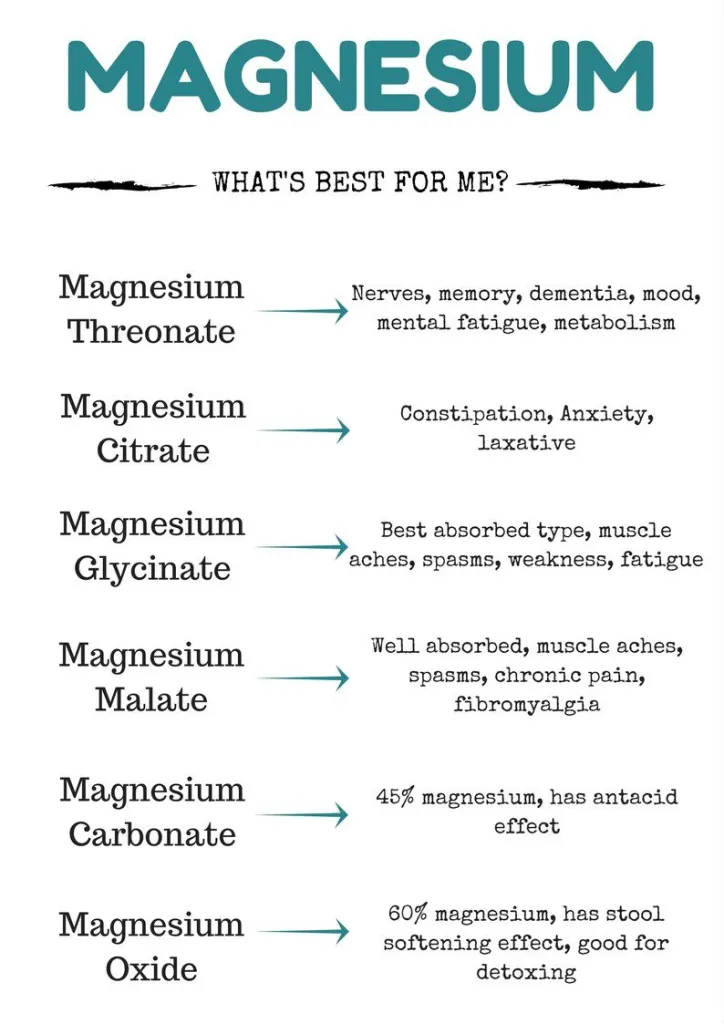When was the last time your provider measured your magnesium levels? Chances are the answer is never, or you have yet to learn if magnesium deficiency has ever been discussed or checked. If so, you are not alone. Although magnesium deficiency is very common during midlife and beyond for women, healthcare providers rarely pursue further investigation. That’s a sad fact, as an important study highlighted a whopping 81.9% of post-menopausal participants are deficient in this vital nutrient!
Why is Magnesium Important During Menopause?
As we age, our bodies naturally experience slower absorption of essential nutrients and minerals such as magnesium. Additionally, our bodies store less magnesium in the bones while our kidneys secrete more through urine. Couple that with decreased food intake due to smaller appetites, and you have magnesium deficiency.
What Are the Symptoms of Magnesium Deficiency?
Once you read the list of all the problems caused by low magnesium, you may be shocked that this important medical detail has been ignored. I know that I was.
My ailments checked most of the boxes for magnesium deficiency. I had written them off as “normal” due to my age and being post-menopausal. But I was wrong! A simple blood test to check magnesium levels revealed a severe magnesium deficiency!
Look at these symptoms that are red flags for low magnesium.
- Anxiety and depression
- Insomnia
- Muscle cramps, stiffness, and weakness
- Headaches
- Fatigue
- High blood pressure
- Low bone density (Osteoporosis/Osteopenia)
- Irregular heartbeat/palpitations
Does this sound like you? I bet that many women are shaking their heads up and down as they read this list. If so, it is time to take matters into your own hands and talk to your provider about getting tested for magnesium deficiency.
Even if your blood tests come back borderline low/normal, you can benefit from increasing your sources of magnesium, especially if you are experiencing the above issues.
How Can Magnesium Make You Feel Better?
Since magnesium helps regulate over 300 different enzymes in the human body, it is no wonder that adequate magnesium levels are vital for overall good health.
Magnesium is a key factor for optimum health in numerous ways, such as:
- Improves sleep
- Eases anxiety and depression
- Lessens fatigue
- Boosts bone health
- Reduces joint and muscle discomfort
- Helps eliminate muscle cramping
- Provides heart protection
- Decreases headache frequency and severity
- Possibly helps with hot flashes, although clinical trial evidence is limited on this topic
Most menopausal women would do just about anything to get a good night’s sleep. To get rid of the persistent fatigue and those annoying foot cramps would be truly amazing! Improved rest (without leg and foot cramps) was my biggest boon once I began supplementation with magnesium.

Sources of Magnesium
The best source of magnesium is through food. It is absorbed better than supplements and does not have any side effects.
Good food sources of magnesium can be:
- Beans and legumes such as black beans
- Whole grains such as brown rice and whole wheat bread
- Green leafy vegetables such as spinach
- Avocados and bananas
- Nuts and seeds (and seed oils such as flaxseed oil)
- Fatty fish such as salmon
- Dark chocolate (yay!)
I create a magnesium-rich smoothie in the morning containing green-leafy veggies, bananas, avocado, flaxseed oil, yogurt, and dark chocolate. It tastes good, and I am making a difference in my diet with this fulfilling drink.
I also add unflavored electrolyte powder to my water, especially on hot days, to keep from depleting my magnesium stores. Just be careful not to overdo it on electrolyte drinks.
Other Sources of Magnesium
What other ways can you boost your magnesium levels besides food sources and supplements with magnesium?
I have found that magnesium is readily absorbed through the skin. Although this method may seem a bit odd, some women find relief by taking the following measures:
- Epsom Salt Soaks. Pour a cup of Epsom salts into warm water for a soothing bath. I especially like the lavender Epson bath salts.
- Magnesium Spray. Some women prefer to spray magnesium on sore spots and the soles of their feet at night to relieve cramps and aches.
- Magnesium Cream. Like the spray, applying magnesium cream to the skin may help increase magnesium levels. Some ladies apply to the back of their neck and skull for headache relief. I found both sprays and creams on Amazon. I had to experiment to find products that helped somewhat.
All About Magnesium Supplements
Companies are making millions on supplements at present. Although food is your best source of magnesium, supplements are a convenient way to acquire adequate amounts of this mineral. I combine food and supplements with an occasional Epsom salt bath or spray.
Magnesium supplements can come in capsule/tablet form or powders.
Many women prefer a popular magnesium powder called Calm. Personally, I stick to supplements that are high quality and recommended by my homeopathic (complementary/holistic) provider.
Here are the basics of magnesium supplementation.
- Pick the correct type of magnesium. There are many different types of magnesium, so it is easy to get confused. Every kind of magnesium affects you differently. Research this area to determine which magnesium type best fits your symptoms, and discuss your plan with your provider.
As you can see, magnesium citrate has a laxative effect. I have found that most types of magnesium keep you regular, but I have to stay away from magnesium citrate due to the intensity of the laxative properties. I prefer a magnesium supplement that combines several of these types listed.
- Take the recommended amount. Magnesium needs vary from person to person. Having your blood tested is where you should start before beginning supplementation. Please discuss with your provider what their recommendations are based on your results.
However, there are basic guidelines for magnesium supplementation, which is 320 mg for women over 30 years old.
- Timing is everything. Many women prefer to take their magnesium at night to help them sleep and calm their minds. Talk to your pharmacist about taking magnesium with your other medication. Magnesium may interact with certain medications if taken at the same time. I must space out my thyroid med with my magnesium supplement by 2 hours for maximum efficiency.
- Keep up with lab work. Once you begin magnesium supplementation, have your provider check your levels periodically. My magnesium levels are checked once or twice a year.
Although magnesium truly can feel like a miracle treatment for women in menopause, it is advised to proceed with caution. Avoid over-supplementation and take it at the discretion of your provider. Timely treatment with magnesium may make a difference in making menopause easier to tolerate.


Leave a Reply